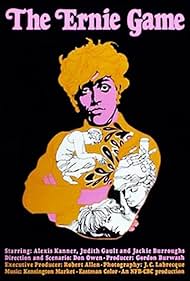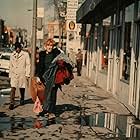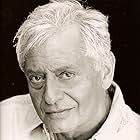Set in mid-winter Montreal, a mentally unstable young man becomes involved with 2 women, which fuels his paranoia, forcing him to commit criminal acts.Set in mid-winter Montreal, a mentally unstable young man becomes involved with 2 women, which fuels his paranoia, forcing him to commit criminal acts.Set in mid-winter Montreal, a mentally unstable young man becomes involved with 2 women, which fuels his paranoia, forcing him to commit criminal acts.
- Awards
- 1 win & 3 nominations
- Director
- Writers
- All cast & crew
- Production, box office & more at IMDbPro
Storyline
Did you know
- TriviaThis was the first co-production between the Canadian Broadcasting Corporation and the National Film Board of Canada.
- ConnectionsFollows Notes for a Film About Donna & Gail (1966)
- SoundtracksStranger
Song by Leonard Cohen
Featured review
Former mental patient, now starving ginger-haired, pockmarked writer/hipster Ernie Turner (Alexis Kanner) drifts around Montreal in winter 1966 stealing various items, romancing various women who are inexplicably attracted to him, couch-surfing and having the most insipid conversations imaginable. Slender, with brooding eyes and a mop of red hair that he sets off with sharp sideburns this Raggedy Andy is somewhere between beatnik and hippie. A sharp-dresser, he can be misidentified as cool. At very least he offers a change of pace.
He is a nice enough guy (though his irritating habitat of pranking people is off-putting particularly when they are complete strangers) and the charismatic vagabond artist-type he passes himself off as has fleeting charm for some women. A lot of them were bringing home strays like Ernie back in the 1960s. Those same women generally split up with guys like Ernie sooner rather than later because he is careless, irresponsible, probably unemployable and not suitable for nesting. Bad feelings often lingered after they tried and failed to change him.
The times when Ernie senses he will lose the women he loves he comes to realize where he is lacking and takes steps to address it. But he can only adopt the extrinsics (haircut, business attire) of responsible people and even then only up until he gets bored with it. The real day-to-day work of adulthood or just about any other pursuit is lost on him. Today's mental health professionals will identify various symptoms of attention deficit hyperactivity disorder in Ernie and probably diagnose a very specific kind. But doctors then, and now would not be able to keep him under constant supervision because his case is not obviously that serious.
Where it has the possibility of becoming deadly serious is when Ernie buys a gun and convinces acquaintance Steve that they can do well for themselves committing armed robbery. As with the women Ernie has led on, the partner in crime is allowed to project the required seriousness upon Ernie to think they can make a go of it. Like Ernie's ex-girlfriends, Steve only finds out the problems Ernie has after being drawn in. Though he still inadvertently plays "Ernie's Game", i.e. an elaborate attempt to do something up until it becomes serious, Steve at very least doesn't get his feelings hurt the way they have.
While I find a number of scenes in this to be cheap, hokey and over the top there is a lot to like in what was captured here. The ending does not dull the sharpness of the portrayal of this troubled young man's odyssey. The resolution is realistic. The loser/hero protagonist used to be a recurring cliché of Canadian cinema. But so was the weirdo/outsider protagonist. Ernie is all of those and Kanner's multi-layered portrayal shows us how he can be interesting even as his character arc is limited. It can tell audiences a lot about a character if he doesn't change. Often it can tell us more about them then if they do.
A weak point of Canadian film is the preponderance of these characters that struggle to subsist or fit in. The foreign film festival circuit loves characters like these. Canadian movie makers made a number of these as their own version of European 1960s New Wave cinema not merely because it was trendy but because art-house fair like this was inexpensive enough for them to stage properly as they did in this joint Canadian Broadcasting Corporation/National Film Board production.
Alexis Kanner should have been a solid building block for Canada's parochial film industry particularly after a few years accumulating a solid reputation in British cinema and television as an uncommonly gifted actor. Lured back to his hometown of Montreal to play the title role in a feature he got an opportunity most don't. But there was not enough work to keep him here until the mid 1970s and by then he wanted to write and direct - very time-consuming pursuits he was unsuited for that kept him from acting.
Had he been inclined he could've augmented numerous Canadian productions in lead and supporting acting roles.
Movie debut of veteran Canadian film and TV star Jackie Burroughs.
Leonard Cohen performs a song during the party scene.
He is a nice enough guy (though his irritating habitat of pranking people is off-putting particularly when they are complete strangers) and the charismatic vagabond artist-type he passes himself off as has fleeting charm for some women. A lot of them were bringing home strays like Ernie back in the 1960s. Those same women generally split up with guys like Ernie sooner rather than later because he is careless, irresponsible, probably unemployable and not suitable for nesting. Bad feelings often lingered after they tried and failed to change him.
The times when Ernie senses he will lose the women he loves he comes to realize where he is lacking and takes steps to address it. But he can only adopt the extrinsics (haircut, business attire) of responsible people and even then only up until he gets bored with it. The real day-to-day work of adulthood or just about any other pursuit is lost on him. Today's mental health professionals will identify various symptoms of attention deficit hyperactivity disorder in Ernie and probably diagnose a very specific kind. But doctors then, and now would not be able to keep him under constant supervision because his case is not obviously that serious.
Where it has the possibility of becoming deadly serious is when Ernie buys a gun and convinces acquaintance Steve that they can do well for themselves committing armed robbery. As with the women Ernie has led on, the partner in crime is allowed to project the required seriousness upon Ernie to think they can make a go of it. Like Ernie's ex-girlfriends, Steve only finds out the problems Ernie has after being drawn in. Though he still inadvertently plays "Ernie's Game", i.e. an elaborate attempt to do something up until it becomes serious, Steve at very least doesn't get his feelings hurt the way they have.
While I find a number of scenes in this to be cheap, hokey and over the top there is a lot to like in what was captured here. The ending does not dull the sharpness of the portrayal of this troubled young man's odyssey. The resolution is realistic. The loser/hero protagonist used to be a recurring cliché of Canadian cinema. But so was the weirdo/outsider protagonist. Ernie is all of those and Kanner's multi-layered portrayal shows us how he can be interesting even as his character arc is limited. It can tell audiences a lot about a character if he doesn't change. Often it can tell us more about them then if they do.
A weak point of Canadian film is the preponderance of these characters that struggle to subsist or fit in. The foreign film festival circuit loves characters like these. Canadian movie makers made a number of these as their own version of European 1960s New Wave cinema not merely because it was trendy but because art-house fair like this was inexpensive enough for them to stage properly as they did in this joint Canadian Broadcasting Corporation/National Film Board production.
Alexis Kanner should have been a solid building block for Canada's parochial film industry particularly after a few years accumulating a solid reputation in British cinema and television as an uncommonly gifted actor. Lured back to his hometown of Montreal to play the title role in a feature he got an opportunity most don't. But there was not enough work to keep him here until the mid 1970s and by then he wanted to write and direct - very time-consuming pursuits he was unsuited for that kept him from acting.
Had he been inclined he could've augmented numerous Canadian productions in lead and supporting acting roles.
Movie debut of veteran Canadian film and TV star Jackie Burroughs.
Leonard Cohen performs a song during the party scene.
- JasonDanielBaker
- Dec 1, 2016
- Permalink
Details
- Release date
- Country of origin
- Official site
- Language
- Also known as
- Ernie
- Filming locations
- Production companies
- See more company credits at IMDbPro
Box office
- Budget
- CA$321,000 (estimated)
- Runtime1 hour 29 minutes
- Sound mix
- Aspect ratio
- 1.75 : 1
Contribute to this page
Suggest an edit or add missing content













